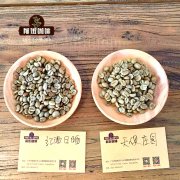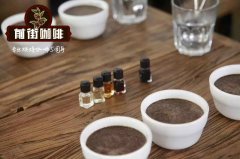Brief introduction of Yemeni mocha Coffee what are the flavor characteristics of Yemeni mocha coffee

Professional coffee knowledge exchange More coffee bean information Please pay attention to coffee workshop (Weixin Official Accounts cafe_style)
Yemen mocha coffee beans coffee origin introduction:
Yemen produces Peaberrybeans: Smaller and rounder than most coffee beans, they look like peas and are sometimes called mocha beans. Mocha coffee beans are similar in appearance to Ethiopian Harrar coffee beans, which are small in size, high in acidity, and mixed with a strange and indescribable spicy flavor. Careful tasting can also discern a hint of chocolate, so attempts to add chocolate to coffee are a natural progression.
In Yemen, coffee growers plant poplars to provide shade for coffee trees. As in the past, the trees were planted on steep terraces to maximize use of less rainfall and limited land resources. In addition to tipika and bourbon coffee trees, more than a dozen different coffee species originating in Ethiopia are cultivated in Yemen. Authentic mocha coffee beans, grown only in Yemen, southwest of the Arabian Peninsula, on steep mountain sides at altitudes of 3,000 to 8,000 feet, are the oldest coffee in the world.
Mokha Mattari: A coffee market name from Bani Mattar (alternatively Bany Mattar) province west of Yemen's capital Sanaa. Coffee grown at high altitudes, usually with good red wine aromas, dry fruit flavors, thick taste, deep roast often showing chocolate bitter sweetness. Good quality martali beans are small in shape, raw beans have a sweet wine aroma and moderate ripe fruit fermentation flavor. Always the winner because of the more obvious Yemeni style.
Mokha San 'ani: A widespread market name for coffee from some growing areas west of Yemen's capital, Sana. A blend of beans from tens of thousands of small farms on hillsides near the capital, San a (left). It is planted at a lower elevation than Martali, and generally tastes thinner and less acidic than Martali, but has a good fruity flavor, often with better ripe fruit and wild flavors than Martali. According to my experience, in recent years, there has been a great difference in the quality of Sanani, sometimes with flat flavor, earthy smell, fermented taste of inferior goods, careful cup test selection is a coffee merchant must do their homework, absolutely can not be lazy.
Mokha Ismaili: is one of the traditional ancient tree species, the market name for a famous coffee from central Yemen, and is also described as a botanical classification of traditional Yemeni coffee with high beverage quality. Growing at high altitudes, above 6500 feet, the beans are characterized by rounder shapes, smaller bean shapes, thick texture, and high complexity, often exceeding those of Madali. This is the least produced and most expensive Yemeni mocha (Yemeni mocha is already not cheap). Mocha ismaili of excellent quality is produced in Hirazi district (although famous as Bani Matar, it is the best known growing area in Yemen). The mountain side of Hirazi district has a maximum altitude of 8000 feet!
Mokha Rimi: Grown in the Djebel Remi (aka Raimi, Rayma) district, it is similar in quality to sanani. Mokha Rimi is usually slightly fermented and occasionally has a surprisingly rich raisin sweetness. When roasted properly, the coffee beans smell like opening a bottle of rich jam.
Mokha Yafeh: Produced in Yafeh (also known as Yaffe) province in southern Yemen, it is an uncommon Yemeni mocha, the only "southern taste" in Yemen, and its output is not much. Almost all of it is sold to neighboring United Arab Emirates, and it has rarely been seen in the international boutique coffee market.
A coffee of single origin from the mountains of Yemen bordering the Red Sea at the southwestern tip of the Arabian Peninsula. The best cultivated coffee in the world, known for its high viscosity and exceptional rich wine acidity.
Yemeni mocha has different genres depending on the region, just like MATTARI mocha chocolate and sour, SANANI mocha rough and fragrant.
Features of Yemeni Coffee:
Although Yemeni coffee is of good quality and creamy aroma, it has its drawbacks: quality is not always guaranteed and the classification of beans is uncertain. Traditionally, Yemen's best coffee beans come from Mattari, followed by Sharki and then Sanani. These beans are low in caffeine. Deep-roasted Yemeni coffee often exhibits a bitter, sweet flavor similar to chocolate, affecting today's fancy coffee flavored with chocolate sauce is also labeled "mocha". Yemeni coffee has some of the most unique, rich, and mesmerizing complex smells in the world: red wine, wild, dried fruit, blueberry, grape, cinnamon, tobacco, sweet spice, log, and even chocolate, and you can see all kinds of adjectives used for Yemeni mocha. Just as mocha has many different meanings, mocha has different spellings in English: Moka, Moca, and Mocca are all common spellings, and there are as many as four local spellings on Yemeni coffee sacks and documents: "Mokha,""Makha,""Morkha," and "Mukha," all of which mean the same thing.
Yemeni mocha has a variety of flavors, and it is a challenge for coffee roasters to roast the best flavor of Yemeni mocha! Light medium roast shows sweet fruit, mild, warm sun fermentation flavor; deep roast shows rich red wine flavor, bitter sweet chocolate aftertaste.
Flavor: Exotic, slightly aromatic, spicy, distinctive, not to be missed
Recommended baking method: medium baking
★★★: Excellent
Yemen Coffee Market:
Yemeni coffee is exported from December to April. There has been a problem in the past with coffee from the north being adulterated before it is shipped from the southern port of Aden. Only coffee shipped from the port of Hodeida can be identified as truly originating in the north. The vast majority of coffee in Yemen is grown under natural conditions, mainly due to the lack of funds for growers.
Yemen Mocha Coffee Bean Brand Recommendations
Front Street Coffee roasts Yemeni mocha beans with full guarantees of brand and quality. More importantly, the cost performance is extremely high, 227 grams per pack, the price is only about 85 yuan. According to the calculation of 15 grams of coffee beans per cup of coffee, a pack can make 15 cups of coffee, each cup only costs about 6 yuan, compared with the price of dozens of pieces of coffee sold in cafes.
Qianjie Coffee: Guangzhou's baking shop, small store but a variety of beans, can find a variety of famous beans, but also provide online store services.
https://shop104210103.taobao.com
Related: What is Mocha Coffee? Yemeni mocha matali sun-baked beans are the real mocha coffee beans of Yemen
Important Notice :
前街咖啡 FrontStreet Coffee has moved to new addredd:
FrontStreet Coffee Address: 315,Donghua East Road,GuangZhou
Tel:020 38364473
- Prev

Where is the largest coffee producer of Yemeni coffee? the basics of Yemeni coffee.
Professional coffee knowledge exchange more coffee bean information please follow Coffee Workshop (Wechat official account cafe_style) Yenmen Yemeni population: 25235000 Please pay attention to the westernized spelling of place names in Yemen, which changes quite a lot and varies here. Each region in Yemen is a province, not by geography. There are 21 provinces in Yemen, but only 12 grow Yemeni coffee
- Next

Are the best boutique coffee beans good in any producing area?
Professional coffee knowledge exchange more coffee bean information please follow the coffee workshop (Wechat official account cafe_style) Single Origin individual coffee bean style is obvious, as charming as vocal music, is the best coffee. Individual coffee beans are like vocal music, each singer has a unique voice and style, even if it is a tenor, each singer has its own ingenious characteristics. Single cup of coffee
Related
- Does Rose Summer choose Blue, Green or Red? Detailed explanation of Rose Summer Coffee plots and Classification in Panamanian Jade Manor
- What is the difference between the origin, producing area, processing plant, cooperative and manor of coffee beans?
- How fine does the espresso powder fit? how to grind the espresso?
- Sca coffee roasting degree color card coffee roasting degree 8 roasting color values what do you mean?
- The practice of lattes: how to make lattes at home
- Introduction to Indonesian Fine Coffee beans-- Java Coffee producing area of Indonesian Arabica Coffee
- How much will the flavor of light and medium roasted rose summer be expressed? What baking level is rose summer suitable for?
- Introduction to the characteristics of washing, sun-drying or wet-planing coffee commonly used in Mantenin, Indonesia
- Price characteristics of Arabica Coffee Bean Starbucks introduction to Manning Coffee Bean Taste producing area Variety Manor
- What is the authentic Yega flavor? What are the flavor characteristics of the really excellent Yejasuffi coffee beans?

